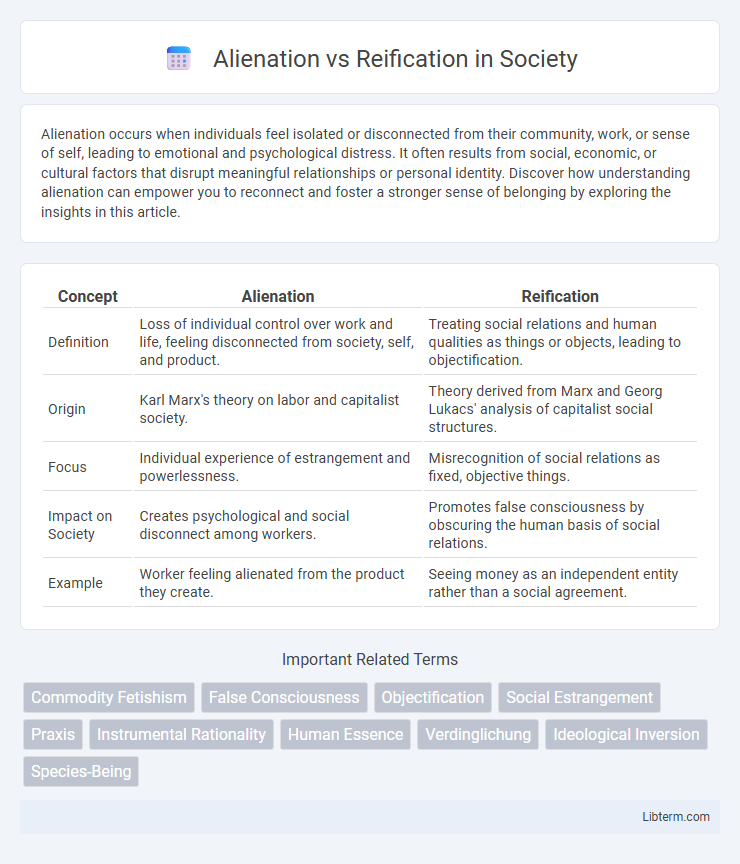Alienation occurs when individuals feel isolated or disconnected from their community, work, or sense of self, leading to emotional and psychological distress. It often results from social, economic, or cultural factors that disrupt meaningful relationships or personal identity. Discover how understanding alienation can empower you to reconnect and foster a stronger sense of belonging by exploring the insights in this article.
Table of Comparison
| Concept | Alienation | Reification |
|---|---|---|
| Definition | Loss of individual control over work and life, feeling disconnected from society, self, and product. | Treating social relations and human qualities as things or objects, leading to objectification. |
| Origin | Karl Marx's theory on labor and capitalist society. | Theory derived from Marx and Georg Lukacs' analysis of capitalist social structures. |
| Focus | Individual experience of estrangement and powerlessness. | Misrecognition of social relations as fixed, objective things. |
| Impact on Society | Creates psychological and social disconnect among workers. | Promotes false consciousness by obscuring the human basis of social relations. |
| Example | Worker feeling alienated from the product they create. | Seeing money as an independent entity rather than a social agreement. |
Understanding Alienation: Definition and Origins
Alienation, rooted in Marxist theory, describes the estrangement of individuals from their labor, products, and self-identity due to capitalist production systems. It originates from Karl Marx's critique of industrial capitalism, where workers lose control and connection to their work, leading to feelings of powerlessness and isolation. This concept highlights how social and economic structures distort human relations and individual potential.
Defining Reification: Conceptual Foundations
Reification, rooted in Marxist theory, conceptualizes the process by which social relations and human attributes are transformed into things or commodities, obscuring their true human origin. This phenomenon entails treating abstract concepts or dynamic social interactions as concrete, static objects, thereby alienating individuals from the social structures they inhabit. Understanding reification reveals how capitalist societies objectify human labor and relationships, leading to a distorted perception of social reality.
Historical Context: Marxist Roots of Alienation and Reification
Alienation and reification originate from Marxist theory, describing how capitalist production estranges workers from their labor, products, and human essence while simultaneously turning social relations into thing-like commodities. Marx's analysis in the 19th century emphasized how alienation manifests in the loss of control and meaning in work, whereas reification captures the transformation of social interactions into impersonal market transactions. This historical context underscores the critical examination of capitalism's dehumanizing effects on individual and collective identity.
Key Differences Between Alienation and Reification
Alienation refers to the estrangement individuals feel from their labor, products, or sense of self within capitalist systems, leading to a loss of autonomy and identity. Reification, on the other hand, involves treating social relations or human qualities as things, causing abstract concepts to appear as concrete, independent entities. The key difference lies in alienation emphasizing subjective human experience and emotional disconnection, while reification focuses on the objective objectification of social phenomena.
Alienation in Modern Society: Contemporary Examples
Alienation in modern society manifests through social media's impact on individual identity, where constant digital interaction often leads to feelings of isolation despite connectivity. Workplace environments increasingly emphasize automation and repetitive tasks, reducing workers' sense of purpose and control over their labor. Urban living conditions, marked by high population density and limited personal space, contribute to social alienation by diminishing meaningful community interactions.
Reification’s Impact on Human Relations
Reification transforms social relations into things, causing people to perceive human interactions as objects or commodities, which diminishes empathy and authentic connection. This process leads to the objectification of individuals, reducing complex human experiences to simplistic, transactional exchanges that undermine community and solidarity. The impact on human relations results in alienation, where individuals feel isolated and disconnected from each other despite constant interaction in a reified social environment.
Interplay Between Alienation and Reification
The interplay between alienation and reification highlights how individuals become estranged from their labor and social relations while perceiving human interactions as objectified commodities. Alienation manifests in the disconnection between workers and the products of their labor, whereas reification reinforces this by transforming social relations into things, obscuring human agency. This dynamic perpetuates a cycle where societal structures dominate individuals, reinforcing both psychological estrangement and the objectification of social life.
Psychological Effects of Alienation and Reification
Psychological effects of alienation manifest as feelings of powerlessness, isolation, and diminished self-worth, often resulting from disconnection between individuals and their labor, social environment, or sense of identity. Reification deepens these effects by objectifying human relations and experiences, causing individuals to perceive social constructs and relationships as fixed, impersonal entities, which exacerbates emotional detachment and cognitive distortions. Both alienation and reification contribute to increased stress, anxiety, and a fragmented sense of self, impacting mental health and interpersonal dynamics significantly.
Overcoming Alienation and Reification: Critical Approaches
Overcoming alienation and reification requires critical approaches that emphasize human agency and social transformation, challenging the objectification of individuals under capitalist structures. Theories rooted in Marxist and critical social thought advocate for increasing consciousness and participatory democracy to dissolve exploitative social relations. Practical strategies include fostering authentic communication, collective empowerment, and reshaping economic institutions to prioritize human needs over commodification.
Future Perspectives: Relevance in a Technological Age
Alienation in the technological age manifests as individuals feel disconnected from automated processes that replace human labor, while reification turns social relationships into mere objects shaped by digital algorithms. Future perspectives emphasize the critical analysis of how AI and machine learning systems can deepen this estrangement by commodifying personal data and reducing human agency. Understanding these concepts aids in designing technology that fosters human-centered connections rather than perpetuating alienation and reification.
Alienation Infographic

 libterm.com
libterm.com